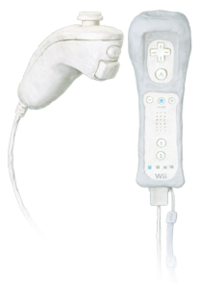Wii: Difference between revisions
mNo edit summary |
mNo edit summary |
||
| Line 10: | Line 10: | ||
== Controller == | == Controller == | ||
[[File:Pm2 whats new.png|thumb|right|Clay versions of the Wii Remote and Nunchuk.]] | [[File:Pm2 whats new.png|thumb|right|Clay versions of the Wii Remote and Nunchuk.]] | ||
The Wii's main controller is the Wii Remote (also known as Wiimote), which has the shape of a regular television remote. This controller has several extra peripherals, most importantly, the Nunchuk. The Wii Remote has six buttons (plus the Home ({{button|wii| | The Wii's main controller is the Wii Remote (also known as Wiimote), which has the shape of a regular television remote. This controller has several extra peripherals, most importantly, the Nunchuk. The Wii Remote has six buttons (plus the Home ({{button|wii|home}}) button, which allows reconnection of controllers, resetting the game and other options regardless of which game is being played) and a D-Pad ({{button|wii|pad}}), as well as a pointer on the front which can tell its own position in relation to a motion sensor (placed in front of the television set) and motion detection technology. The Nunchuk can be connected and disconnected from the Wii Remote and has two triggers, the Z ({{button|wii|z}}) and C ({{button|wii|c}}) buttons, as well as an analog stick ({{button|wii|stick}}), but limited motion detection. | ||
==References== | ==References== | ||
Revision as of 09:32, September 5, 2016
|
This article or section needs to be cleaned up, either its format or general style. |
|
This article or section is a short summary on Wii. |
The Wii is Nintendo's fifth home console, released in late 2006. Its controller is the first in a Nintendo video-game system to use a motion sensor to control games. It is capable of playing GameCube games and so can play both Pikmin and Pikmin 2. The respective New Play Control! versions of each of these are specifically for the Wii, and use its motion controls. Super Smash Bros. Brawl is also played on this console, which has Olimar and Pikmin as a playable character.
In 2008 it was announced that Pikmin 3 was planned for the Wii.[1] However, at E3 2011 it was announced that Pikmin 3 would instead be released on the Wii U.[2]
Controller
The Wii's main controller is the Wii Remote (also known as Wiimote), which has the shape of a regular television remote. This controller has several extra peripherals, most importantly, the Nunchuk. The Wii Remote has six buttons (plus the Home (![]() ) button, which allows reconnection of controllers, resetting the game and other options regardless of which game is being played) and a D-Pad (
) button, which allows reconnection of controllers, resetting the game and other options regardless of which game is being played) and a D-Pad (![]() ), as well as a pointer on the front which can tell its own position in relation to a motion sensor (placed in front of the television set) and motion detection technology. The Nunchuk can be connected and disconnected from the Wii Remote and has two triggers, the Z (
), as well as a pointer on the front which can tell its own position in relation to a motion sensor (placed in front of the television set) and motion detection technology. The Nunchuk can be connected and disconnected from the Wii Remote and has two triggers, the Z (![]() ) and C (
) and C (![]() ) buttons, as well as an analog stick (
) buttons, as well as an analog stick (![]() ), but limited motion detection.
), but limited motion detection.
References
- ^ Pikmin 3 confirmed to be on Wii on MyWii
- ^ Pikmin 3 will now be on Wii U on IGN
